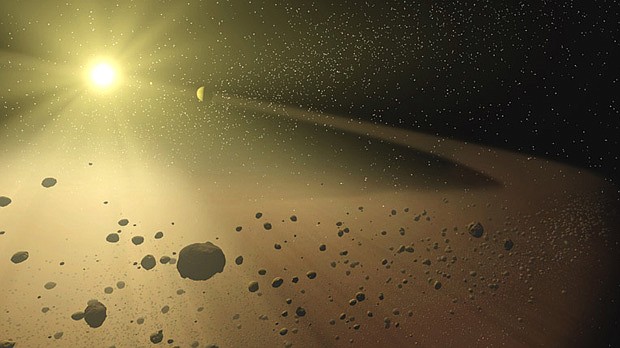- April 22, 2024
-
-
Loading

Loading

At 2:26 p.m. Eastern Time on Friday, telescopes across the globe will all be fixed to the same small gleaming light flashing across the sky.
To the naked eye they’ll be nothing, says University of Central Florida professor and asteroid expert Humberto Campins, and even to a high-powered telescope it’ll be a small shining light, growing brighter and darker as it moves by in a flash. But to Campins, and all those invested in the research of asteroids, the closest approach of Asteroid 2012 DA14 will be a learning experience a lifetime in the making.
“In terms of visually its not going to be that spectacular, but the information that we get from this pass is going to be really spectacular,” Campins said.
DA14, he said, is the closest asteroid in history to pass by the Earth’s atmosphere without entering it. On Friday, Feb. 15, the 147-foot asteroid will soar approximately 17,200 miles above the Earth’s surface, making it nearly 20-times closer to the planet than the moon.
This close-proximity pass, Campins said, will allow researchers across the globe to use their newest technologies to examine the asteroid both in composition and movement. To use the landmark event as a community-wide teaching tool, Campins, along with other UCF professors and their students, will host an Asteroid Viewing Party in the campus’ Pegasus Ballroom from 1 to 3 p.m. on Friday, Feb. 15.
UCF’s Asteroid Viewing Party 2013 will take place in the Pegasus Ballroom within the Student Union from 1 to 3 p.m. on Friday, Feb. 15. The event is free. For more information, visit www.cos.ucf.edu/asteroid/students
“We want to educate and entertain,” Campins said. The event will feature four speakers on different important aspects of asteroid studies, interactive building-your-own edible asteroid demonstrations, and a live feed from a telescope tracking DA14’s approach in Spain.
Vice President of the UCF Astronomy Society and senior physics major Allison Bratcher said she hopes the event will call attention to the nation and world’s need to fund asteroid research. This asteroid may not be on a crash course with Earth, she said, but in the future another one inevitably will.
“The biggest reason is defense,” she said. “Asteroids don’t often cross paths with the Earth, but we know there are many that do. And it’s not a chance of if one hits us, it’s when. So being able to study this particular asteroid and how earth’s gravity pull effects its trajectory will help us predict better if something is coming our way.”
Asteroids are also believed to provide a wealth of rare organic materials that may be harvestable to provide fueling of future space travel, their composition, Campins said, also possibly holding the key to out solar system’s history, which make opportunities like DA14’s passing worth noting.
Asteroid DA14, estimated to be the size of half a city block, even if it was slated to hit Earth, Campins said, would not be large enough to cause widespread global devastation. For that, he said, it’d have to be anywhere from half a mile to a mile long. As of now, there are no asteroids nearby of that size slated to cross paths with our planet, but someday, one will, he said, and we need to be ready, which studying DA14 can help us do.
“The chances of an asteroid large enough to cause global devastation are so low during our lifetimes, that as individuals we should not worry,” Campins said. “But as a civilization we should … We know they have happened, and we know they are likely to happen in the future so we are preparing to deflect one if one were to threaten Earth.”